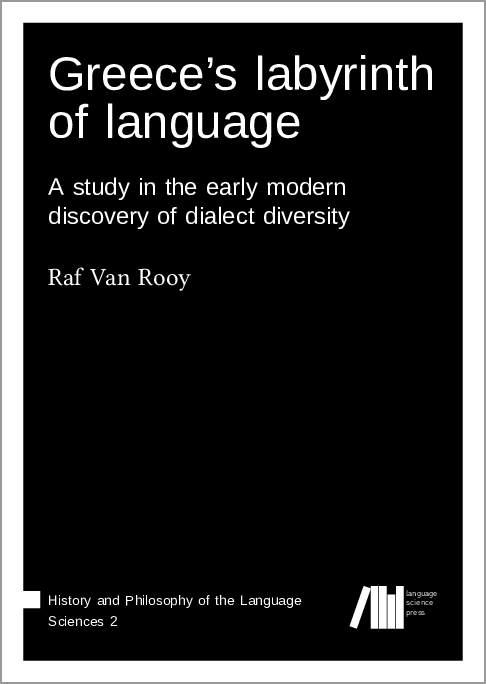We log anonymous usage statistics. Please read the privacy information for details.
Greece’s labyrinth of language: A study in the early modern discovery of dialect diversity
Synopsis
Fascinated with the heritage of ancient Greece, early modern intellectuals cultivated a deep interest in its language, the primary gateway to this long-lost culture, rehabilitated during the Renaissance. Inspired by the humanist battle cry “To the sources!” scholars took a detailed look at the Greek source texts in the original language and its different dialects. In so doing, they saw themselves confronted with major linguistic questions: Is there any order in this immense diversity? Can the Ancient Greek dialects be classified into larger groups? Is there a hierarchy among the dialects? Which dialect is the oldest? Where should problematic varieties such as Homeric and Biblical Greek be placed? How are the differences between the Greek dialects to be described, charted, and explained? What is the connection between the diversity of the Greek tongue and the Greek homeland? And, last but not least, are Greek dialects similar to the dialects of the vernacular tongues? Why (not)? This book discusses and analyzes the often surprising and sometimes contradictory early modern answers to these questions.
"This work offers readers a thoroughly novel and particularly enlightening perspective on Ancient Greek dialects through its examination of how the study of these dialects developed in ancient up through pre-modern times. Deftly interweaving discussions of dialectological detail with a consideration of the emergence of various classificatory schemes over many centuries, author Van Rooy has produced a fine work that has much of interest to a wide audience of Hellenists, Classicists, linguists, and historians of the language sciences."
— Brian Joseph, Distinguished University Professor of Linguistics, Ohio State University
Reviews
-
Review in Histoire Epistémologie Langage 43 (1)
by Rhéa Delveroudi
published October 29, 2021
... Faisant preuve d’érudition, [Raf Van Rooy] nous offre à la fois le panorama des études sur les dialectes grecs de l’époque moderne et un précieux ouvrage de référence pour qui veut s’informer sur l’histoire de la dialectologie grecque. En adoptant une approche critique et comparative de ses sources, non exempte parfois d’un brin d’humour, agréablement inattendu, il présente des données pour une large part difficilement accessibles, non seulement par la rareté des exemplaires, mais aussi par le nombre des langues de son corpus et de la bibliographie secondaire, difficilement maîtrisable par une seule personne ...
-
Review in Language & History
by Anneli K. Luhtala
published August 28, 2022
[...] Greece’s Labyrinth of language is an impressive volume, full of detail and based on the study of a huge number of primary sources (p. 161–191), many of which are poorly known. It is a rich sourcebook for those who are interested in the early developments of dialectology and the history of Greek poetry. The subject is notoriously difficult, and it is easy to agree with the Spanish humanist Juan Luis Vives (1492 /1493–1540), who wrote that ‘in the Greek language, there are great labyrinths’. The lack of historicity was often a major source of confusion, another being the absence of adequate technical terms relating to the linguistic phenomena which are today understood as dialects, sociolects, register, style, and genre. Raf Van Rooy entered the labyrinth of Greek dialects and brought back an excellent piece of work, contributing to our understanding of early modern linguistic thought and intellectual history. [...]




